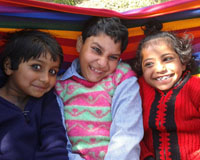Every parent of a disabled child knows that many aspects of life will be more challenging for them, whether the disability is physical or mental. In the US, we have a plethora of treatment options, both through the public school system and through private therapies. In India, if you have a disabled child, not only are there few treatment options, but parents also suffer from severe prejudice against their child. The belief system in India focuses heavily on the concept of karma, so those with disabled children are thought to have done something wrong in their previous lives that caused their child to be punished with this affliction. Disability is looked upon as a curse and a cause for shame, and the level of shame is based on the severity of the disability. Those with disabilities are often hidden at home so the shame is not exposed. People believe that it is a bad omen to spend time around a disabled person. On a spiritual plane, parents are told to pray to their gods for their child’s healing, and when it does not come about, they are told they don’t have enough faith. Sometimes the child’s disability is even blamed on the sin of the parent. They even go so far as to say the disabled child is afflicted with an evil spirit and then try to use black magic to evict it.
disability is physical or mental. In the US, we have a plethora of treatment options, both through the public school system and through private therapies. In India, if you have a disabled child, not only are there few treatment options, but parents also suffer from severe prejudice against their child. The belief system in India focuses heavily on the concept of karma, so those with disabled children are thought to have done something wrong in their previous lives that caused their child to be punished with this affliction. Disability is looked upon as a curse and a cause for shame, and the level of shame is based on the severity of the disability. Those with disabilities are often hidden at home so the shame is not exposed. People believe that it is a bad omen to spend time around a disabled person. On a spiritual plane, parents are told to pray to their gods for their child’s healing, and when it does not come about, they are told they don’t have enough faith. Sometimes the child’s disability is even blamed on the sin of the parent. They even go so far as to say the disabled child is afflicted with an evil spirit and then try to use black magic to evict it.
In order to address these issues, Dr. Jubin Varghese at Herbertpur Christian Hospital began Anugraha, a Community Health and Development Program focused on disabled individuals. Anugraha began by focusing on children and then grew to include disabled adults. Their learning center operates in the village two or three days a week, providing therapy, life skills development, and support. They have a five-pronged approach: health, education, livelihood, social needs, and involvement. The health component focuses on physical and occupational therapy as well as orthotics and other needed equipment. If a child can be mainstreamed, they work with the government schools to help provide disabled children a solid education by making sure they have the basic skills for learning. For older disabled people, they try to help them find a livelihood by introducing them to groups who have income-generating projects. For their social needs, they connect them with the governing body in the village so that they can communicate their needs and be recognized as a village member. Another important aspect is helping people with different disabilities be involved in one another’s lives. Dr. Varghese has also assisted in the development of disability programs at five other EHA hospitals: Landour Community, Duncan, Baptist Christian, Chattarpur Christian, Nav Jivan, and Kacchwa Christian Hospital.
Dr. Varghese has learned the hard way that her team must not focus simply on advocacy and the rights of the disabled, looking at people as projects to be fixed. Rather, they must be more focused on relationships, because relationships are what will change the culture. Disabled people need to make friends with non-disabled people, and they often need help for this to happen because of the prejudice against them. Even the church tends to believe what the culture tells them. Dr. Varghese has worked with churches to help them understand that they are central to reaching out to the disabled. They need to help others understand that disability is not a curse or a result of sin, but simply a condition a person struggles with. If the church reaches out to the disabled in love, they will have a window to share the gospel with this rejected group.
A Publication of EHA USA | December 2015
